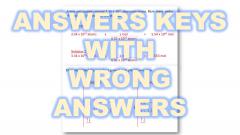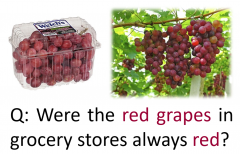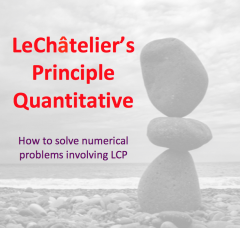The April 2022 Xchange highlights some of the contributions that have recently been published on ChemEd X. We hope you will take a moment to check in and see what you may have missed.
An Education Communication About Cation-Containing WordsFor your enjoyment, the authors present lists of chemically-related words that end in the letters “-cation” but do not actually refer to the positively-charged chemical species. The lists are available for download in the Supporting Information. |
||
Ionic Formula WordleBring the fun of the viral word game "Wordle" into the chemistry classroom! |
||
Is Chocolate Cake an Acid-Base Indicator? Testing a Student ClaimRecently, Josh Kenney took time from his regular scheduled chemistry curriculum to investigate a student's claim that chocolate cake was an acid-base indicator. |
||
Stoichiometry Scavenger HuntEngage your students with this stoichiometry scavenger hunt! |
||
Answer Keys with Wrong AnswersPractice problem answer keys that provide correct and incorrect answers increase student metacognition and lead to more thorough learning. |
||
ChemEd X Journal Club: Ceramics Applications in AP ChemistryYou are invited to participate in a zoom meeting hosted by Dr. Melanie J. Harvey, Johnson County Community College, on April 7 at 7:00 pm CST (8:00 pm EST) to discuss Dr. Christopher R. Vyhnal’s paper, “Curricular Materials on the Chemistry of Pottery, Including Thermodynamic Calculations for Redox Reactions in the 3-Stage Firing Process of Athenian Black- and Red-Figure Vases Produced from the Sixth-Fourth Centuries BCE,” published this year in the Journal of Chemical Education. Register early! This ChemEd X Journal Club is limited to the first 50 registrations. |
||
Are Red Table Grapes Sold in Stores Always Red?Structure. Structure. Structure. This blog post describes a classroom activity where students propose the structure of a molecule- based on bond type information- used to accelerate the change in color of red table grapes. |
||
Virtual Professional Development: Creating Cognitively Demanding TasksLearn how to create cognitively demanding tasks for your classroom during this Knowles Academy virtual course. |
||
Microscale and the Perfect StormChad Husting tries out some micro-scale labs. |
||
Quantitative LeChâtelier’s Principle: From ICE Table to MICE tableMichael Jansen typically teaches his students to solve qualitative chemical equilibrium problems using an ICE table but once students have mastered this skill, he introduces LeChâtelier’s Principle and a modified quantitative ICE table. |
||
ChemEd X Call for ContributionsChemEd X invites practitioners in the chemical education community to share their experiences, knowledge and the resources they use in their classroom and laboratory. |
 |
|
We hope you enjoy the content mentioned here and other content at ChemEd X. If you find ChemEd X content useful, please consider purchasing a subscription to help support ChemEd X using our online store. In addition to supporting the free content we make available, you will also get access to our complete video collection and other titles to help in teaching and learning chemistry. If you would like to contribute content, begin with the contribute page. For other questions or comments, please use our contact form.










